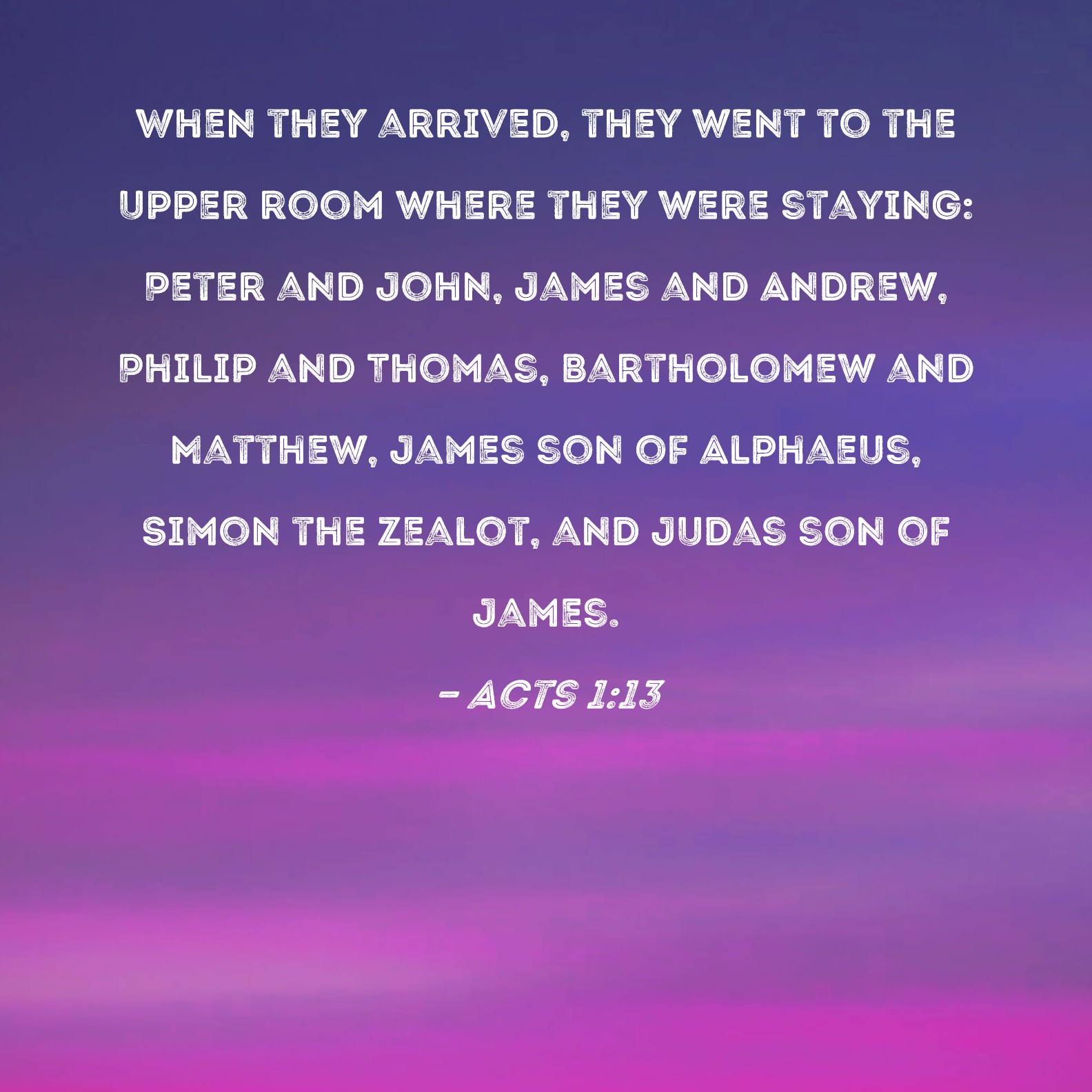Well, in fac
1) - Acts one
- After his death Jesus appeared many times to the disciples for a period of 40 days!
- And he kept speaking about the Kingdom of God!
- And he told them to stay in Jerusalem to be baptized with holy spirit!
- And they would spread the good news of the Kingdom all around the world!
- When he was telling them these things he was lifted up and he disappeared in a cloud!
- Then two men in white appeared to them and told them that they would see Jesus appearing as he left them!
- And the apostles were together with disciples for a total of 120 people!
- And Peter spoke in front on all saying that it was necessary for the scripture to be fulfilled!
- They had to choose a disciple who had been with Jesus and the apostles from the beginning to replace Judas!
- And Matthias was chosen!
Jesus chose Paul, case closed.
When they arrived, they went to the upper room where they were staying: Peter and John, James and Andrew, Philip and Thomas, Bartholomew and Matthew, James son of Alphaeus, Simon the Zealot, and Judas son of James.
biblehub.com
When
ὅτε (hote)
Adverb
Strong's 3753: When, at which time. From hos and te; at which too, i.e. When.
they arrived,
εἰσῆλθον (eisēlthon)
Verb - Aorist Indicative Active - 3rd Person Plural
Strong's 1525: To go in, come in, enter. From eis and erchomai; to enter.
they went
ἀνέβησαν (anebēsan)
Verb - Aorist Indicative Active - 3rd Person Plural
Strong's 305: To go up, mount, ascend; of things: I rise, spring up, come up. From ana and the base of basis; to go up.
to
εἰς (eis)
Preposition
Strong's 1519: A primary preposition; to or into, of place, time, or purpose; also in adverbial phrases.
the
τὸ (to)
Article - Accusative Neuter Singular
Strong's 3588: The, the definite article. Including the feminine he, and the neuter to in all their inflections; the definite article; the.
upper room
ὑπερῷον (hyperōon)
Noun - Accusative Neuter Singular
Strong's 5253: Neuter of a derivative of huper; a higher part of the house, i.e. Apartment in the third story.
where
οὗ (hou)
Adverb
Strong's 3757: Where, whither, when, in what place. Genitive case of hos as adverb; at which place, i.e. Where.
they were
ἦσαν (ēsan)
Verb - Imperfect Indicative Active - 3rd Person Plural
Strong's 1510: I am, exist. The first person singular present indicative; a prolonged form of a primary and defective verb; I exist.
staying:
καταμένοντες (katamenontes)
Verb - Present Participle Active - Nominative Masculine Plural
Strong's 2650: To wait, stay (with), remain, abide, dwell. From kata and meno; to stay fully, i.e. Reside.
Peter
Πέτρος (Petros)
Noun - Nominative Masculine Singular
Strong's 4074: Peter, a Greek name meaning rock. Apparently a primary word; a rock; as a name, Petrus, an apostle.
and
καὶ (kai)
Conjunction
Strong's 2532: And, even, also, namely.
John,
Ἰωάννης (Iōannēs)
Noun - Nominative Masculine Singular
Strong's 2491: Of Hebrew origin; Joannes, the name of four Israelites.
James
Ἰάκωβος (Iakōbos)
Noun - Nominative Masculine Singular
Strong's 2385: The same as Iakob Graecized; Jacobus, the name of three Israelites.
and
καὶ (kai)
Conjunction
Strong's 2532: And, even, also, namely.
Andrew,
Ἀνδρέας (Andreas)
Noun - Nominative Masculine Singular
Strong's 406: From aner; manly; Andreas, an Israelite.
Philip
Φίλιππος (Philippos)
Noun - Nominative Masculine Singular
Strong's 5376: From philos and hippos; fond of horses; Philippus, the name of four Israelites.
and
καὶ (kai)
Conjunction
Strong's 2532: And, even, also, namely.
Thomas,
Θωμᾶς (Thōmas)
Noun - Nominative Masculine Singular
Strong's 2381: Thomas, also called Didymus, one of the Twelve. Of Chaldee origin; the twin; Thomas, a Christian.
Bartholomew
Βαρθολομαῖος (Bartholomaios)
Noun - Nominative Masculine Singular
Strong's 918: Of Chaldee origin; son of Tolmai; Bar-tholomoeus, a Christian apostle.
and
καὶ (kai)
Conjunction
Strong's 2532: And, even, also, namely.
Matthew,
Μαθθαῖος (Maththaios)
Noun - Nominative Masculine Singular
Strong's 3156: Matthew. A shorter form of machomai; Matthaeus, an Israelite and a Christian.
James [son]
Ἰάκωβος (Iakōbos)
Noun - Nominative Masculine Singular
Strong's 2385: The same as Iakob Graecized; Jacobus, the name of three Israelites.
of Alphaeus,
Ἁλφαίου (Halphaiou)
Noun - Genitive Masculine Singular
Strong's 256: Alphaeus; apparently two persons, (a) father of Levi, and (b) father of James. Of Hebrew origin; Alphoeus, an Israelite.
Simon
Σίμων (Simōn)
Noun - Nominative Masculine Singular
Strong's 4613: Simon. Of Hebrew origin; Simon, the name of nine Israelites.
the
ὁ (ho)
Article - Nominative Masculine Singular
Strong's 3588: The, the definite article. Including the feminine he, and the neuter to in all their inflections; the definite article; the.
Zealot,
Ζηλωτὴς (Zēlōtēs)
Noun - Nominative Masculine Singular
Strong's 2207: One who is eagerly devoted to a person or a thing, a zealot. From zeloo; a 'zealot'.
and
καὶ (kai)
Conjunction
Strong's 2532: And, even, also, namely.
Judas [son]
Ἰούδας (Ioudas)
Noun - Nominative Masculine Singular
Strong's 2455: Of Hebrew origin; Judas, the name of ten Israelites; also of the posterity of one of them and its region.
of James.
Ἰακώβου (Iakōbou)
Noun - Genitive Masculine Singular
Strong's 2385: The same as Iakob Graecized; Jacobus, the name of three Israelites.

